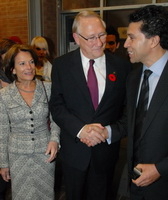Following a bizarre campaign, Gerald Tremblay won his third consecutive term Sunday, the first mayor to do so since Jean Drapeau in 1966. But the comparisons end there. Drapeau won with 95.4 per cent of the popular vote. A majority of those who did vote on Sunday split their ticket. The Mayor lost some of his most experienced right hand men, notably his brother, Marcel Tremblay in Villeray-St. Michel- Park Extension, Michael Prescott in the Plateau Mont-Royal district as well as André Lavallée, in Rosemont, and Diane Lemieux, the star candidate earmarked to run Tremblay’s executive committee, who also went down to defeat in Ahunstic.
By staying away from the polls in large numbers again, electors demonstrated a troubling indifference to municipal politics. It is hard, it seems, to get Montrealers outraged about anything these days. In this Mayor Tremblay’s patrimoine term, he will give this city a lasting legacy if he helps change that.
It is perhaps worth noting that the last time voter turnout exceeded 50 per cent in a Montreal municipal election was 1982, when Drapeau defeated Jean Doré. Like Drapeau in 1982, Tremblay returns to office with his sails trimmed and an impressive opposition breathing down his neck. His Union Montreal party lost seats to both Louise Harel’s Vision Montreal and to Richard Bergeron’s quixotic Project Montreal.
Though the Mayor has a very workable majority, City Council has not been as fragmented since the three years Sarto Fournier was mayor in the late 1950s.
Of those who did bother to cast ballots, a significant number were still seduced by Louise Harel’s siren song of separatism. Mme. Harel will sit in council as a formidable opposition leader. An equally significant number of voters, especially in the Plateau, were prepared to shake things up by putting their trust in Project Montreal’s surrealists who have some wild and wacky ideas about how to run a city.
The campaign was one of the most competitive in recent municipal history, but at times it seemed more like a reality television show - a competition among three equally troubling or troubled candidates that was reduced to irritating sound bites. Overlooked by most election night commentators is what is now at stake.
 Tarred by revelations of price fixing and corruption Tremblay’s new administration will have to make good on its promise to appoint an ethics commissioner. But patronage is endemic, and won’t be easy to eliminate. It goes back more than a century to the days when Raymond Préfontaine was mayor, to a time when 25 percent of the city budget went to line the pockets of 23 of the city`s aldermen. A government inquiry back then determined the city had been “saturated with corruption, arising mainly from the scourge of patronage,” and that the aldermen had been “boodling and engaged in abuses of all kinds.” The solution to the boodling was to increase the number of ward heeling alderman, thereby compounding the original problem. Graft is not the immediate problem. The budget is. Montreal by law, is not allowed to run a deficit.
Tarred by revelations of price fixing and corruption Tremblay’s new administration will have to make good on its promise to appoint an ethics commissioner. But patronage is endemic, and won’t be easy to eliminate. It goes back more than a century to the days when Raymond Préfontaine was mayor, to a time when 25 percent of the city budget went to line the pockets of 23 of the city`s aldermen. A government inquiry back then determined the city had been “saturated with corruption, arising mainly from the scourge of patronage,” and that the aldermen had been “boodling and engaged in abuses of all kinds.” The solution to the boodling was to increase the number of ward heeling alderman, thereby compounding the original problem. Graft is not the immediate problem. The budget is. Montreal by law, is not allowed to run a deficit.
Tremblay will be hard pressed to chart a course between the demands of Quebec City and the 27 rambunctious rookies on council calling for change.
It will take more than platitudes to keep this administration on a true compass.

























Comments
Please login to post comments.